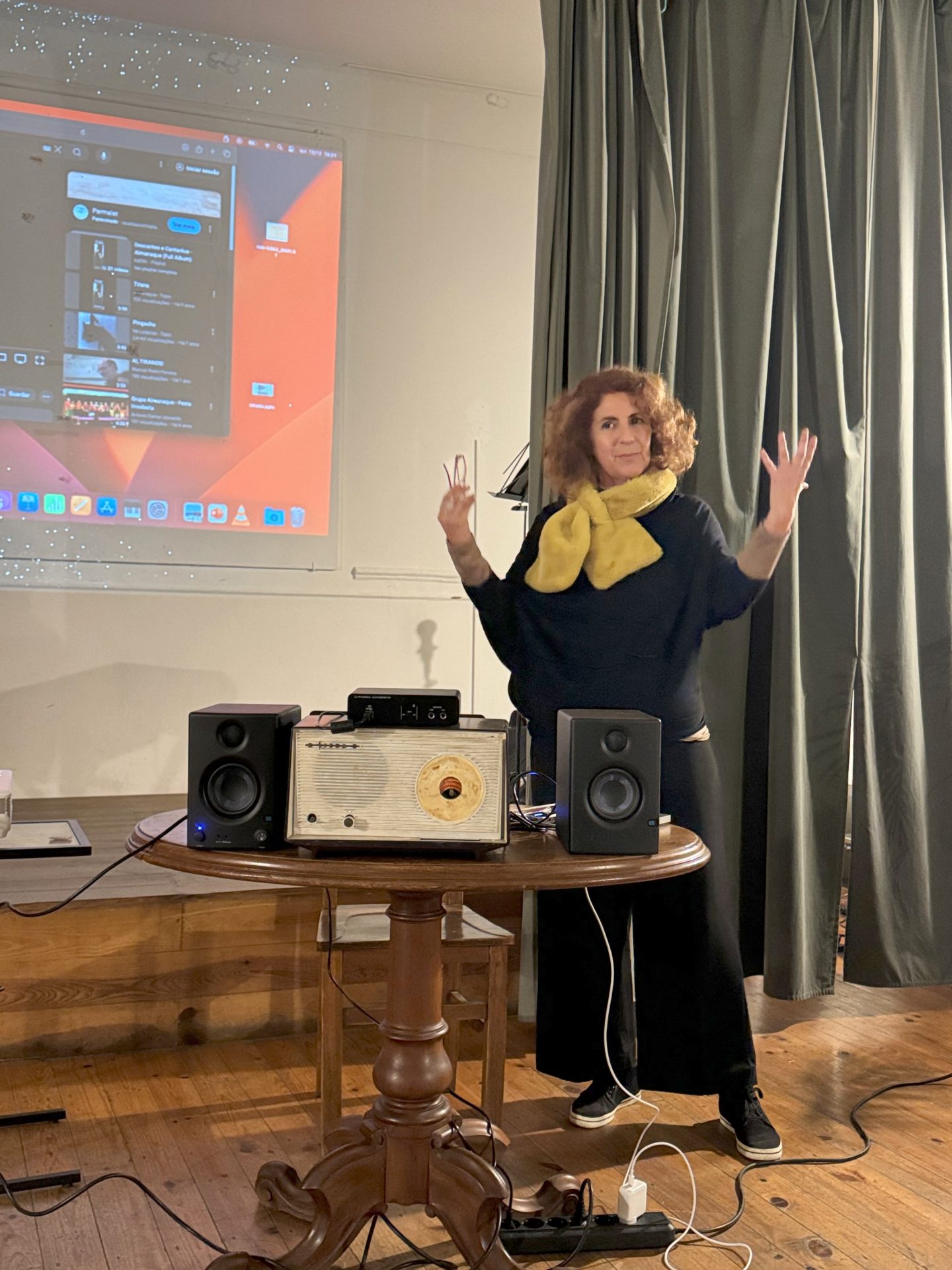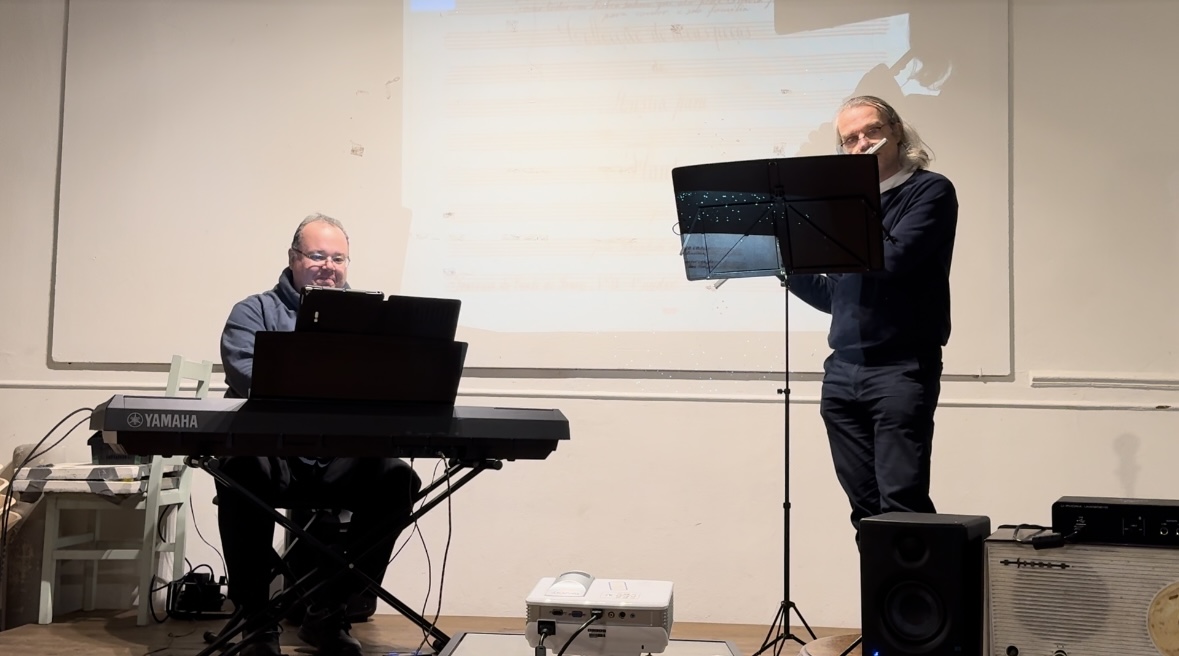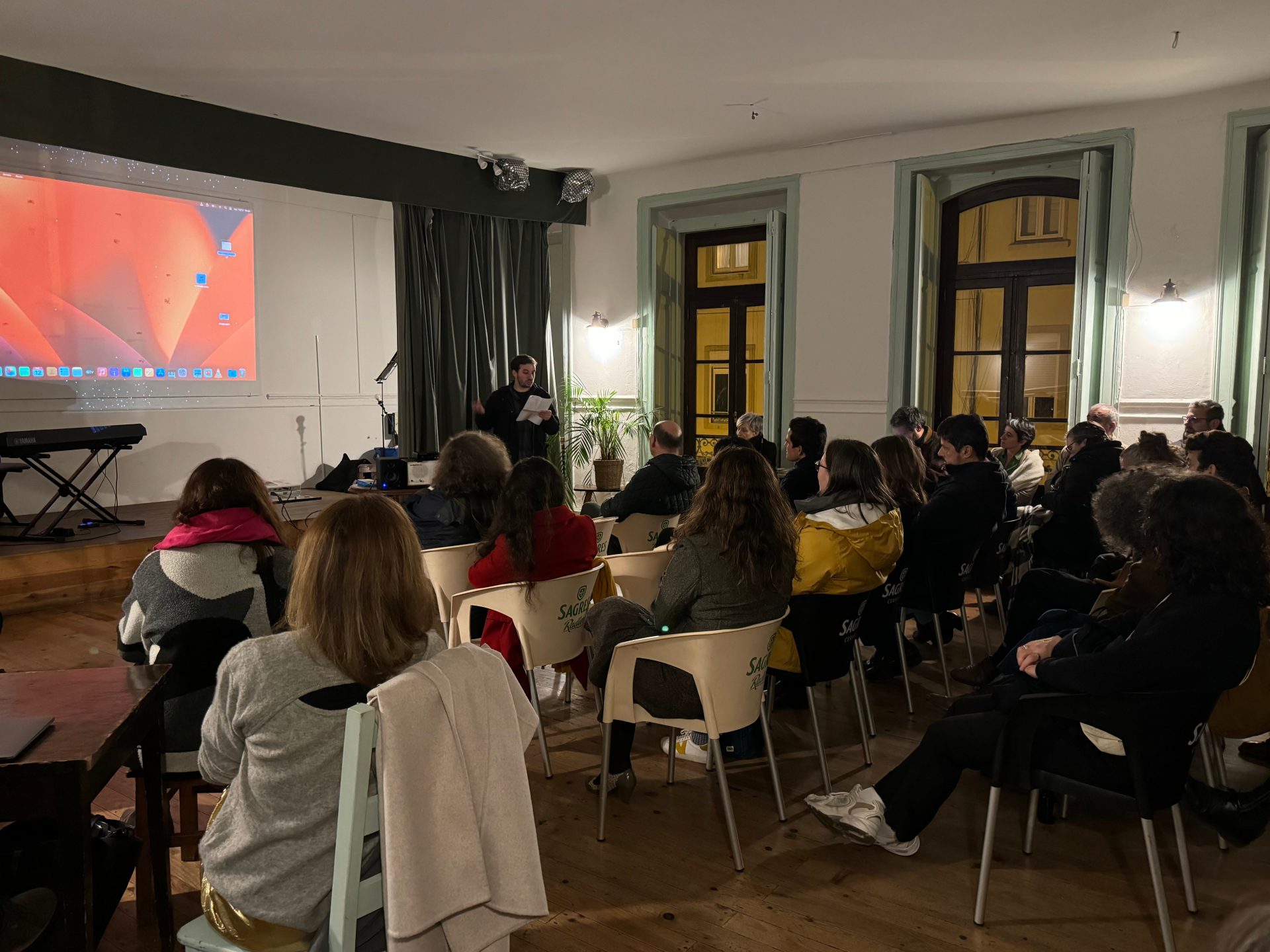‘It is a song whose music is part of the recent tradition of Lisbon’s neighbourhood-oriented popular march and whose lyrics are playfully constructed through the evocation of various places and neighbourhoods in the city.’ If you are familiar with José Mário Branco’s work, you will know that we are talking about Qual é a tua, ó meu? (what’s your deal, man?, very loosely translated), a composition that lends its name to IN2PAST’s 2nd Field Trip and which was discussed by CESEM – NOVA FCSH / IN2PAST researcher Manuel Pedro Ferreira last Thursday, December 12th, at A Padaria do Povo, in Lisbon, which hosted the initiative.
Our session of music listening with commentary brought nine songs to this historic place of Lisbon’s associative and co-operative life, discussed by eight IN2PAST researchers, with different authors, stories and genres, with the aim of providing all the participants with an exploration of the relationships between sounds and the territories in which they were produced or which they occupy. The following morning, we visited the Centro de Estudos e Documentação José Mário Branco – Música e Liberdade (José Mário Branco Research and Documentation Centre – Music and Freedom), or CEDJMB-ML, a collaboration between CESEM and INET-md, located at NOVA FCSH.
And because Qual é a tua, ó meu? is also a libel against dictators’, Manuel Pedro Ferreira, who was part of the choir that recorded it in the studio, also performed his own piece Ai tiranos! (oh tyrants!), based on a biblical text (Micah 2-4), the last song he shared with José Mário Branco, with whom he had a long personal relationship.
Lo Pingacho, a traditional sung dance from the Miranda do Douro region, in northeastern Portugal, was the choice of Vanda de Sá, who presented the album Descantes e Cantaréus at A Padaria do Povo, to recall Grupo Almanaque, of which she was a member, ‘and which did a lot of work collecting and interpreting traditional Portuguese music, especially in the 1980s’.
‘Like many cultural expressions from cross-border areas, this sung dance, part of the cultural heritage of the Miranda do Douro region, reflects influences shared between Portugal and Spain,’ explains the CESEM – University of Évora / IN2PAST researcher, recalling that Lo Pingacho crosses the border and is danced at the frontier between Spain and Portugal, ’using the mirandês [Portugal’s second official language] as an expression of linguistic resistance, but also musical.’ A space of borders ‘that are constantly crossed, on a daily basis, inadvertently, distractedly…’, she adds.
‘A particular social and historical experience of a territory: the experience of road workers in the interior of the island of Santiago’, in Cape Verde, is what Strada communicates, says Rui Cidra, who chose the song by Tcheka (Manuel Lopes Andrade), with the collaboration of Mário Laginha, for our guided music listening session. ‘Although it’s called Strada (Road), it’s not a song about mobility,’ says the IHC – NOVA FCSH / IN2PAST researcher: ’it’s about a certain immobility, it’s about living in an impasse, being stuck in a given territory, for reasons to do with poverty.’
Drift Furioso (furious drift), by DJ Marfox, ‘is a pioneering testimony to the self-representation of the Portuguese black community, which hasn’t found expression in political and cultural institutions, but has found in music a space for representation and expression on its own terms’, states João Mineiro, who selected this song, included in the compilation DJs Di Guetto (2006), by Marfox, N.K., Jesse, Fofuxo and Pausas.
‘An unexpected fusion of kuduro, funaná, tarraxo, techno and afro-house, this album became a landmark in music made in Portugal, crossing African rhythms with European and global Afro-diasporic electronics,’ explains the CRIA – Iscte / IN2PAST researcher, adding that ’this sound fusion gave rise to a unique musical identity, reflecting the encounter of different urban, historical and cultural geographies.’
‘From Portela to Quinta do Mocho, from Linha de Sintra to Margem Sul, the music translates the subjective experience of the black and Afro-descendant community on the outskirts of Lisbon, affirming a syncretic and plural identity,’ observes João Mineiro, while at the same time subverting the rules of the musical field: ’far from the centres of cultural production, and not dependent on publishers, curators, journalists and gatekeepers, these artists have assumed that everyone can make music.’

Vanda de Sá (CESEM – UÉvora / IN2PAST) took Lo Pingacho to the guided music listening session in A Padaria do Povo, Lisbon, December 12, 2024. © Ana Sofia Malheiro

CESEM – NOVA FCSH / IN2PAST Zuelma Chaves‘s chosen music was performed live by Abel Chaves (electric piano) and António Jorge Marques (flute). © Ana Sofia Malheiro

© Ana Sofia Malheiro
Júlia Durand‘s choice was The Return, by The Khoury Project, an extract from the soundtrack composed in 2013 for the 1926 animated feature film The Adventures of Prince Achmed, by Lotte Reiniger. ‘This soundtrack represents not a real territory, but what can be imagined from it, playing with the stereotypes of a romanticised Middle East,’ notes the CESEM – NOVA FCSH / IN2PAST researcher. ‘Far from sticking to the historical and ethnographic reality of the territory in which the animation is inspired, The Khoury Project’s music for the film mobilises various musical resources to build the sonic imagery of a fantasised place, with a tangle of diverse sound references that are here displaced from their initial geographical contexts.’
O Passeio de Buster Keaton (Buster Keaton’s Walk), sequence no. 11 of FE…DE…RI…CO…, by Constança Capdeville (1937-1992), was reproduced and commented on by Filipa Magalhães, who is working to recover the memory of the leading composer of theatre-music in Portugal.
FE…DE…RI…CO… premiered at the Centro de Arte de Moderna, in Lisbon, in 1987, to celebrate the 50th anniversary of the death of Spanish poet and playwright Federico García Lorca (1898-1936), one of the first victims of the Spanish Civil War, on whose poetic, plastic and musical work Capdeville drew. The video reproduced by Filipa is part of a recreation carried out by the CESEM – NOVA FCSH / IN2PAST researcher, based on her doctoral research, and presented at Teatro Aberto, in Lisbon, in 2022.
IN2PAST Field Trips aim to bring researchers closer to non-academic people and places. The 1st Field Trip took place in Guimarães on September 28th and 29th, and included the ‘Troubles with Primitivism – a view from Portugal’ Meetings. The next one will take place at the end of January in Extremo, Arcos de Valdevez, North of Portugal.
© Ana Sofia Malheiro